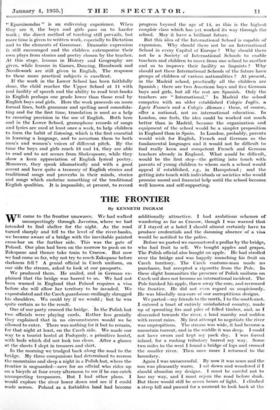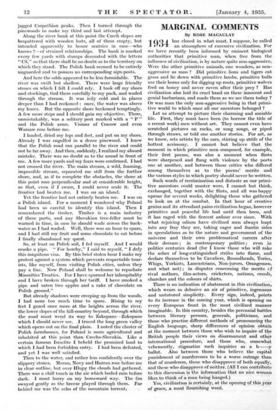THE FRONTIER
By KENNETH INGRAM
WE came to the frontier unawares. We had walked unsuspectingly through Javorina, where we had intended to find shelter for the night. As the road turned sharply and fell to the level of the river-banks, we became aware of a bridge with the inevitable painted cross-bar on the further side. This was the gate of Poland. Our plan had been on the morrow to push on to Zakopane and thence take train to Cracow. But now we had come so far, why not try to reach Zakopane before darkness fell ? A genial official in Czech uniform, on our side the stream, asked to look at our passports.
We produced them. He smiled, and in German ex- plained that the bridge was barred to us. We had not been warned in England that Poland requires a visa before she will allow her territory to be invaded. We expostulated and the Czech guardsman smilingly shrugged his shoulders. We could try if we would ; but he was quite certain as to the result.
One of our party crossed the bridge. In the Polish but two officials were playing cards. Rather less genially they explained that in no circumstances would we be allowed to enter. There was nothing for it but to remain, for that night at least, on the Czech side. We made our way to a tourist hostel at Podspady, a primitive hostel, with beds which did not look too clean. After a glance at the sheets I slept in trousers and shirt.
In the morning we trudged back along the road to the bridge. My three companions had determined to recross the mountains and sleep a night in a Polish hut, where the frontier is unguarded—save for an official who rides up on a bicycle at four every afternoon to see if he can catch unsuspecting trespassers. But I had other plans. I would explore the river lower down and see if I could .wade across. Poland as a forbidden land had become additionally attractive. I had ambitious schemes of wandering as far as Cracow, though I was warned that if I stayed at a hotel I should almost certainly have to produce credentials and the damning absence of a visa would be notified to the police.
Before we parted we encountered a pedlar by the bridge, who had fruit to sell. We bought apples and grapes. The Polish official also bought an apple. He had strolled over the bridge and was happily munching his fruit on Czech territory. The Czech customs-man made no purchases, but accepted a cigarette from the Pole. In these slight humanities the presence of Polish uniform on Czech soil does not become an international incident. The Pole finished his apple, threw away the core, and recrossed the frontier. He did not even regard us suspiciously. He was blissfully unaware of our surreptitious designs.
We parted—my friends to the north, I to the-south-east. I entered a tract of entirely uninhabited country, made up of sprouting firs and piles of felled timber, and, as I descended towards the river, a land marshy and sodden with recent rains. My first attempt to negotiate the river was unpropitious. The stream was wide, it had become a mountain torrent, and in the middle it was deep. I could not have swum and kept my pack dry. I was forced inland, for a rushing tributary barred my way. Some two miles to the west I found a bridge of logs and crosscd the smaller river. Then once more I returned to the boundary.
Again I was unsuccessful. By now it was noon and the sun was pleasantly warm. I sat down and wondered if I should abandon my designs. I must be careful not to lose my way, and I must rejoin the road before dusk. But there would still be seven hours of light. I climbed a steep hill and paused for a moment to look back at the jagged Carpathian peaks. Then I turned through the pinewoods to make my third and last attempt.
Along the river bank at this point the Czech slopes are bespattered with wooden huts, all of them empty, but intended apparently to house sentries in case—who knows ?—of strained relationships. The bank is marked every few yards with stumps decorated with the letters " CS," so that there shall be no doubt as to the territory on Which they stand. The Polish bank seemed to be entirely unguarded and to possess no corresponding sign-posts.
And here the odds appeared to be less formidable. The river was swift but shallow. There were large friendly stones on which I felt I could rely. I took off my shoes and stockings, tied them carefully to my pack, and waded through the stream. It was icily cold and in places deeper than I had reckoned ; once, the water was above my knees. But the opposite shore beckoned temptingly. A few more steps and I should gain my objective. There, unmistakably, was a solitary post marked with a " P " and the Polish arms. Visions of Cracow and even Warsaw rose before me.
I landed, dried my legs and feet, and put on my shoes. Already I was engulfed in a dense pinewood. I knew that the Polish road ran parallel to the river and could not be far away. And then, suddenly, I realized my absurd mistake. There was no doubt as to the sound in front of me. A few more yards and my fears were confirmed. I had not crossed the river. The main stream, a wild, foaming, impossible stream, separated me still from the further shore, and, as if to complete the obstacles, the shore at this point rose perpendicular and at considerable height, so that, even if I swam, I could never scale it. The frontier had beaten me. I was on an island.
Yet the frontier had not entirely beaten me. I was on a Polish island. For a moment I wondered why Poland had been so careful to identify this island. Then I remembered the timber. Timber is a main industry of these parts, and any Slovakian tree-feller must be warned in time, in case he should wade across the back- water as I had waded. Well, there was an hour to spare, and I had still my fruit and some chocolate to eat before I finally abandoned my quest.
- So, at least on Polish soil, I fed myself. And I would smoke a pipe. " For hereby," I said to myself, " I defy this iniquitous visa. By this brief stolen hour I make my protest against a system which prevents respectable tour- ists, like myself, from visiting Polish cities, unless they pay a fine. Now Poland shall be welcome to repudiate Minorities Treaties. For I have spurned her inhospitality and I have broken through her tariff. I have smoked a pipe and eaten two apples and a cake of chocolate on Polish ground."
But already shadows were creeping up from the woods. I had none too much time to spare. Rising to my feet I gazed once more at the heights across the river. the lower slopes of the hill-country beyond, through which the road must wend its way to Zakopane—Zakopane which I should never see. I traced the long green valley which opens out on the final plain. I noted the cluster of Polish farmhouses, for Poland is more agricultural and inhabited at this point than Czecho-Slovakia. Like a certain famous Israelite I beheld the promised land to which I had been forbidden entry. I had been defeated, and yet I was well satisfied.
Then to the water, and rather less confidently over the slippery stones. Muran, Novy and Harran rose before me in clear outline, but over Hlupy the clouds had gathered. There was a chill touch in the air which boded rain before dark. I must hurry on my homeward way. The firs swayed gently as the breeze played through them. Far behind me was the echo of the mountain torrent.







































 Previous page
Previous page